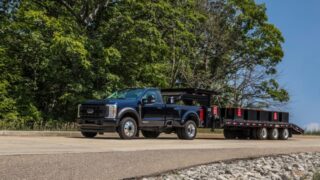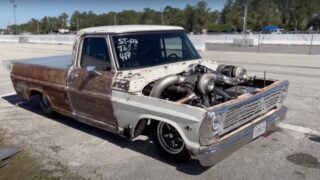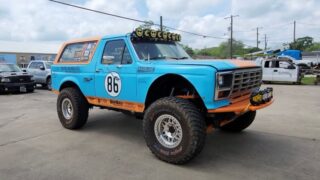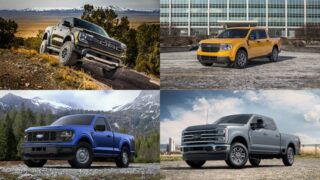NEW 2011 FORD SUPER DUTY POWER STROKE DIESEL OFFERS CUSTOMERS MORE FUELING CHOICES
As diesel fans around the world anticipate National Biodiesel Day on
March 18, the birthday of the famed engine inventor, Rudolf Diesel,
Ford readies for customers the new 2011 Super Duty and its all-new
6.7-liter Power Stroke V-8 turbocharged diesel engine with unsurpassed
biodiesel compatibility.
The new diesel engine, available in the 2011 Ford F-Series Super
Duty, is B20 compatible, which allows customers an additional fueling
option that uses blends of up to 20 percent biodiesel and 80 percent
petroleum diesel. Biodiesel is a type of diesel fuel that is derived
from renewable energy sources and feedstocks, such as vegetable oils and
animal fats.
This additional fueling flexibility is important to a wide range of
customers. Renewable, biodegradable fuels are especially vital in the
agricultural segment, where biodiesel is often the preferred fuel.
Nationally, government fleet customers and energy providers must
comply with the Energy Policy Act (EPACT) of 1992, which mandates that
a certain percentage of new vehicle purchases have alternative fuel
capability. Additionally, certain states and municipalities offer
credits or incentives that encourage B20 use, making it an attractive
alternative.
According to biodiesel.org, the 500 million gallons of fuel
the U.S. biodiesel industry produced in 2007 offset nearly 12 million
barrels of oil. The organization also reported that a recent study
concluded that in 2007 alone, the biodiesel industry supported more than
21,000 jobs and added more than $4 billion to the nation’s Gross
Domestic Product (GDP).
New diesel engine’s extreme durability testing
During the Super Duty’s development, engineers put more than 10.3
million equivalent test miles on the new diesel engine, including
extreme road and weather conditions. The new Power Stroke diesel is the
most tested Power Stroke ever, incorporating the most rigorous engine
tests found in Ford globally.
Customer data, including driving styles, road types and vehicle usage
(towing and payload), also played a key role in developing the
testing program that best replicated Super Duty use.
Components were tested in the laboratory with a regimen designed to
exceed what even the most extreme-use customer might dish out. Engines
literally ran continuously for hundreds of hours.
This strict testing work helped ensure the new engine is B20
compatible. Because biodiesel fuel varies in quality in the U.S. and
Canada, durability testing cycles were run on multiple blends of the
fuel to ensure the robustness of the system. Engine components that
are not compatible with B20 will suffer premature wear or corrosion
and will have a high potential for leaks if the sealing components are
not compatible with biofuels.
Specific steps for B20 compatibility
To address the challenges presented by biodiesel, the engineering team
performed a complete review of biodiesel fuel properties (history and
lessons learned) and examined the effects on each system, subsystem
and component of the engine and vehicle to determine how best to
design and test each component. Ford’s multifaceted approach included
extensive testing on the dynamometer, the vehicle and in the
laboratory to ensure compatibility.
"The entire vehicle was extensively tested on B20 to ensure
compatibility of the vehicle fuel system components, including fuel
filters, lines and connections," said Ed Waszczenko, lead diesel engine
durability engineer. "Each component that is exposed to the fuel was
tested in a ‘worst case’ proprietary fuel mixture to prove
compatibility and durability."
Customers who opt for the more environmentally friendly fuel can rest
assured they will receive top performance. The new 6.7-liter Power
Stroke V-8 turbocharged diesel engine is rated at a significantly
improved 735 ft.-lb. of torque at 1,600 rpm and 390 horsepower at 2,800
rpm.
"The customer will not see any degradation in performance with
biofuels up to B20," Waszczenko said. "Also, testing was conducted to
simulate how some customers will use biofuels. This included switching
from normal diesel fuel to B20 fuel, just like a customer might do."
This increased flexibility is an important component of the new
engine.
"Diesel engines account for 65 percent of Super Duty sales," said
Doug Scott, Truck Group marketing manager. "Increased biodiesel
compatibility is something many of our customers have been looking for."
"The 2011 Ford F-Series Super Duty is all about meeting and exceeding
customer demands across a wide range with the ‘and solution,’" said
Scott. "Ford delivers best-in-class maximum capability and
best-in-class fuel economy, with an average 18 percent improvement among
diesel pickups and 25 percent improvement in diesel chassis cabs
compared with 2010 models, and B20 compatibility."
###
About Ford Motor Company
Ford Motor Company, a global automotive industry leader based in
Dearborn, Mich., manufactures or distributes automobiles across six
continents. With about 198,000 employees and about 90 plants worldwide,
the company’s automotive brands include Ford, Lincoln, Mercury and
Volvo. The company provides financial services through Ford Motor Credit
Company. For more information regarding Ford’s products, please visit
www.ford.com.




